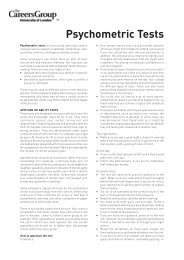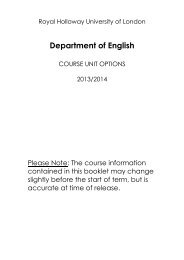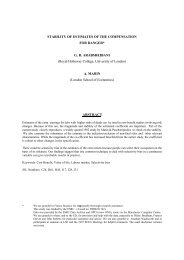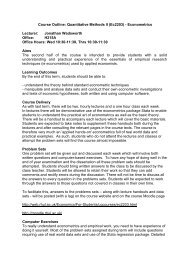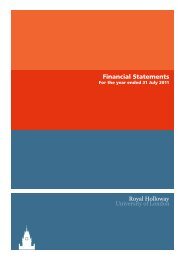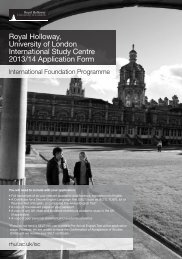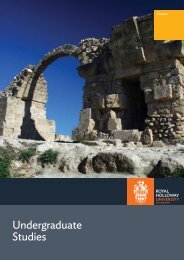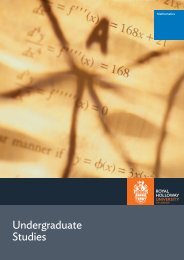Classics, Class, and Cloaca: Harrison's Humane Coprology
Classics, Class, and Cloaca: Harrison's Humane Coprology
Classics, Class, and Cloaca: Harrison's Humane Coprology
Create successful ePaper yourself
Turn your PDF publications into a flip-book with our unique Google optimized e-Paper software.
<strong><strong>Class</strong>ics</strong>, <strong>Class</strong>, <strong>and</strong> <strong>Cloaca</strong>:<br />
Harrison’s <strong>Humane</strong> <strong>Coprology</strong><br />
EDITH HALL<br />
In 1975, Tony Harrison published his translation<br />
of a selection of epigrams by Palladas, a fourth-century<br />
citizen of Alex<strong>and</strong>ria <strong>and</strong> one of the last pagan poets. Harrison<br />
had been inspired by Peter Jay’s modern verse translations<br />
of ancient Greek epigrams, mostly drawn from the<br />
Greek Anthology. 1 Palladas’ cynical voice clearly struck a<br />
chord in the alienated young Harrison, who described it at<br />
the time as “the authentic snarl of a man trapped physically<br />
in poverty <strong>and</strong> persecution, <strong>and</strong> metaphysically in a deep<br />
sense of the futile.” 2 Through this separate edition Harrison<br />
rescued the distinctive individual voice of the ancient poet<br />
from centuries of anthologized oblivion. Amongst the verses<br />
Harrison chose to translate (which include satirical lines on<br />
the problems involved in reading canonical literature, misogynist<br />
tirades, <strong>and</strong> meditations on the brevity of life) is this<br />
succinct assault on another poet:<br />
Where’s the public good in what you write,<br />
raking it in from all that shameless shite,<br />
hawking iambics like so much Betterbrite?<br />
(Harrison’s no. 43 = The Greek Anthology 11.291)<br />
Bad poetry, composed to make money, is “shameless shite,”<br />
which rhymes with Betterbrite. The poet whom Palladas is<br />
attacking is compared with someone selling lamp oil, <strong>and</strong> it<br />
seems that Harrison has here invented a new product, inspired<br />
by the famous British “direct sales” company Betterware,<br />
whose inexpensive range of cleaning <strong>and</strong> other household<br />
arion 15.2 fall 2007
112 classics, class, <strong>and</strong> cloaca<br />
products was (<strong>and</strong> still is) sold by door-to-door salesmen <strong>and</strong> is<br />
culturally associated with aspirational, petit bourgeois housewives.<br />
If the Betterware Company were to have made a lighting<br />
product, it would have called it Betterbrite.<br />
But this apparently facetious little translation reveals Harrison’s<br />
struggles to define his own role as a literary figure.<br />
The poet whose shameless shite has failed to impress Palladas<br />
is criticized on the remarkable ground that there is no<br />
“public good” in what he writes. For Palladas, this idea is an<br />
unusually responsible one, but it has always been central to<br />
Harrison’s own poetic project. In Palladas’ Greek, as Harrison<br />
will have been aware, the question “where’s the public<br />
good?”—more literally, “how have you been useful for the<br />
polis?” (tivwjfevlhsa~ th;n povlin)—harks all the way back to<br />
the earliest extended discussion of the role of poetry in society,<br />
Aeschylus’ debate with Euripides in Aristophanes’ Frogs.<br />
But the phrase “useful for the polis” resonates most profoundly<br />
with the passage in Plato’s Republic where Socrates<br />
declares that the poets will be turned away from the city until<br />
someone can prove to him that what they compose is useful<br />
to the community as well as pleasurable (10.607d6–9).<br />
This brief translated poem also contains three other ideas<br />
that will repeatedly intertwine with expressions of the public<br />
role of poetry throughout Harrison’s corpus of plays, screenplays,<br />
<strong>and</strong> poems. The first is the remuneration of poets. The<br />
second is the comparison of composing poetry with the material<br />
production involved in working-class trades, since for<br />
Harrison, whose father was a baker, the poet is a “maker,” a<br />
poie _ te _ s in the ancient Greek sense. Both these str<strong>and</strong>s are especially<br />
prominent in Poetry or Bust (1993), the play about<br />
the early nineteenth-century wool-sorter <strong>and</strong> “Airedale<br />
poet,” John Nicholson. But the third idea introduced in the<br />
Palladas translation is the relationship between the production<br />
of poetry <strong>and</strong> the production of “shite,” waste matter,<br />
by the human body. Harrison did find the idea of using a<br />
swear-word to describe the socially useless poet’s output in<br />
Palladas, who calls it blasfhmiva~ (approximately equivalent
Edith Hall 113<br />
to the English term “profanities”). But it is Harrison who<br />
chose an English-language equivalent that had a scatological<br />
overtone not to be heard in the Greek.<br />
<strong>Class</strong>ical inspiration, class analysis, <strong>and</strong> cloacal imagery<br />
provide an appropriately alliterative cluster of ideas around<br />
which to structure a celebratory study of some of Tony Harrison’s<br />
verse, or at least of one innovative str<strong>and</strong> within it.<br />
My underlying premise is not new: it is simply that Harrison<br />
has faced up to the qu<strong>and</strong>ary of working in a medium whose<br />
consumers are not of the same class as that into which he<br />
was born—<strong>and</strong> to which he remains loyal—through his own<br />
br<strong>and</strong> of classicism. His radical treatment of <strong><strong>Class</strong>ics</strong> has underpinned<br />
his quest for a public role for a poet who never<br />
forgets the way the middle class’s prosperity has been built<br />
on the working class’s deprivation. As Lorna Hardwick has<br />
put it, the impact of his classical education has been “to<br />
st<strong>and</strong> out as a mark of alienation, both personal <strong>and</strong> cultural,<br />
from his working-class roots.” 3 Harrison also uses<br />
classical myth in the attempt to forge an inclusive public poetry<br />
rather than an exclusive curriculum. 4 He has been described<br />
as “a public poet in the classical tradition,” a role<br />
that he has forged so successfully by involving his poems in<br />
public affairs that in the early 1990s he was actually put on<br />
a retainer by the left-Liberal Guardian newspaper, which<br />
asked him to provide “a few poems a year on contemporary<br />
themes.” 5 But the way he uses that classical tradition of public<br />
poetry is consistently class-conscious <strong>and</strong> oppositional: it<br />
is, in Patrick Deane’s acute formulation, “the deft <strong>and</strong> opportunistic<br />
annexation of classical authority by a poet not<br />
born to it.” 6<br />
<strong>Coprology</strong>, this essay suggests, has proved a generative in<br />
Harrison’s quest for imagery through which to explore the<br />
painful tension created in his work by his “dual” class identity,<br />
<strong>and</strong> by his own ambivalence towards elite culture. 7 In<br />
his earlier poetry, this tension was often focused on his relationship<br />
with his parents, <strong>and</strong> especially with his father. 8 It is<br />
expressed most succinctly of all in “Turns,” from The School
114 classics, class, <strong>and</strong> cloaca<br />
of Eloquence. In this poem he proclaims his class solidarity<br />
in calling his father’s cloth hat not “his cap” but “our cap.”<br />
But he also acknowledges the fact that he is earning a living<br />
by writing poetry that is read only by the higher classes in<br />
whose service, as a worker in an industry with an arduous<br />
daily routine, his father had ruined his health:<br />
I’m opening my trap<br />
to busk the class that broke him for the pence<br />
that splash like brackish tears into our cap.<br />
But that father worked in the food industry, <strong>and</strong> the digestive<br />
function of the human body has become increasingly<br />
important to Harrison over the past two decades. Three<br />
decades after the Palladas collection, in 2005, two poems in<br />
Under the Clock display precisely the <strong><strong>Class</strong>ics</strong>-class-cloaca<br />
cluster of associated ideas, now developed into very different,<br />
but equally arresting directions. The first is the wonderful<br />
little poem “The Ode Not Taken,” subtitled “C. T.<br />
Thackrah (1799–1833)”; it is Charles Turner Thackrah<br />
whom the poetic voice celebrates. A controversial Leeds surgeon,<br />
Thackrah had trained at Guy’s Hospital alongside a<br />
famous poet:<br />
Dissecting corpses with Keats at Guy’s,<br />
Leeds-born Thackrah shared the poet’s TB.<br />
Cadavers that made Keats poeticize<br />
made Thackrah scorn the call of poetry.<br />
But the reason why Harrison is interested in Thackrah is<br />
that he became a pioneering researcher into occupational<br />
disease. From 1817, he was Leeds Town Surgeon, with responsibility<br />
for the care of the city’s paupers. His commitment<br />
to the improvement of his fellow citizens’ lot led to his<br />
1831 treatise, The Effects of the Principal Arts, Trades on<br />
Health <strong>and</strong> Longevity. The st<strong>and</strong>ard textbook on the subject<br />
for six decades, this study detailed the diseases associated<br />
with more than one hundred <strong>and</strong> fifty occupations, especially<br />
work in textile factories <strong>and</strong> by children, <strong>and</strong> the ways
Edith Hall 115<br />
in which they could be prevented by modifications in diet,<br />
posture, exercise, pollution, <strong>and</strong> ventilation. Thackrah became<br />
an important supporter of the movement to reform<br />
factories <strong>and</strong> reduce working hours.<br />
Yet he had originally been destined for a career as a clergyman,<br />
which had entailed receiving a classical education,<br />
<strong>and</strong> Harrison muses on his preference for medicine over a<br />
more cerebral profession. Thackrah<br />
Could write hexameters by Virgil’s rules,<br />
<strong>and</strong> parrot Latin epics but he chose<br />
flax-hecklers’ fluxes with their “gruelly” stools,<br />
the shit of Yorkshire operatives, in prose.<br />
Medical research on the digestive system of the late Georgian<br />
Yorkshire proletariat, necessary to the improvement of<br />
their working <strong>and</strong> living conditions, was the achievement of<br />
this trenchant native of Leeds. In celebrating it, Harrison reflects<br />
on both the parallels <strong>and</strong> contrasts between the production<br />
of Latin verses (part of the elite education of the<br />
Georgian gentleman) <strong>and</strong> the production of polemical, campaigning<br />
medical prose. Furthermore, the movement in this<br />
sentence from the neutral reference to the hexameters of Virgil<br />
through the less respectful allusion to being able “to parrot”<br />
Latin epics, to the hardcore realism of quotation from<br />
Thackrah himself on the flax-worker’s “gruelly” stools, concisely<br />
conveys the impression of a man with a mission <strong>and</strong><br />
no time to waste on cultural irrelevancies. (Indeed, his time<br />
really was curtailed because he only undertook his medical<br />
training at the cost of acquiring the tuberculosis that eventually<br />
killed him.) The workers’ own shit in this poem thus<br />
functions as nothing less profound <strong>and</strong> political than a permanent<br />
reproach to the British class system.<br />
This is a noteworthy poetic function for human excrement.<br />
It is also virtually without precedent. A few recent<br />
writers of prose fiction, including Salman Rushdie in Midnight’s<br />
Children <strong>and</strong> some of the novelists discussed by Reinhold<br />
Kramer in his study of scatology in English-Canadian
116 classics, class, <strong>and</strong> cloaca<br />
literature, have recently used excrement to mark class structures.<br />
9 But in poetry, shit has been <strong>and</strong> still is almost always<br />
used to characterize things which are perceived as unpleasant<br />
negatives, <strong>and</strong> especially to alienate the reader from<br />
them. Scatological satire, in which it is never advantageous<br />
to be represented by shit, has been around for a very long<br />
time, as anyone versed in Aristophanes or Martial (both authors<br />
with whom Harrison has engaged extensively) will be<br />
well aware. 10 Scatological vituperation has played a timehonored<br />
role in attacks on artistic or intellectual efforts, ever<br />
since Aristophanes’ Clouds <strong>and</strong> Catullus’ famous assault on<br />
Volusius’ Annals as cacata carta, “shit-smeared sheets”<br />
(36.1). 11 Characters in Jonson’s dramas both echo these ancient<br />
models <strong>and</strong> share in what has been called “the copious<br />
<strong>and</strong> ubiquitous scatological rhetoric of Early Modern Europe”<br />
when they imagine putting the paper on which the<br />
works of rivals were written to the use of cleansing the “posterior.”<br />
12 But in the English language, the filthiest <strong>and</strong> most<br />
vituperative scatology is probably provided by the “high<br />
heroic Games” held by the dunces in the second book of<br />
Pope’s Dunciad (2.18); the excrement on which they slip <strong>and</strong><br />
in which they dive <strong>and</strong> swim invariably st<strong>and</strong>s as a<br />
metaphor for the inferiority of both their writings <strong>and</strong> their<br />
morals (see 2.69–108, 272, 276–78). On one occasion Harrison<br />
seems to turn such scatological invective on his own<br />
poetry—or at least on the potential insult to working-class<br />
suffering involved in composing sonnets to be read by the<br />
bourgeoisie. A prime example is in one of the embedded<br />
voices in “Working,” the sonnet for Patience Kershaw, the<br />
teenage mine-worker whose testimony was recorded by the<br />
1842 Children’s Employment Commission: “this wordshift<br />
<strong>and</strong> inwit’s a load of crap / for dumping on a slagheap.” 13<br />
For Dante, it is moral sins such as flattery <strong>and</strong> fraud which<br />
find a major metaphor in excrement. 14 Scatology that is politically<br />
rather than aesthetically or morally engaged also has a<br />
very long history. One of Juvenal’s illustrations of the instability<br />
of human fortune takes the form of the chamber pots
Edith Hall 117<br />
that have been made from Sejanus’ statue, once melted down<br />
(10.61–64). During the English Civil War, excremental imagery<br />
was used by poets on both sides to characterize the repellent<br />
nature of the agendas of their opponents, although the<br />
Royalist anti-Parliamentarians had the advantage here simply<br />
because the term “Rump Parliament” was so suggestive. 15 In<br />
France, the very doctors of the absolute monarch Louis XIV<br />
were gratified to discover that his discreet <strong>and</strong> inoffensive<br />
bowel movements reflected his unique status <strong>and</strong> perfection<br />
<strong>and</strong> therefore that of the monarchical body politic; they were<br />
rarely loose, because “nobody in the whole world has been as<br />
much a master of himself as the King.” 16 In the late nineteenth<br />
<strong>and</strong> early twentieth centuries, the sheer shock factor in<br />
the public, theatrical use of scatological language had a social<br />
<strong>and</strong> ultimately political impact, above all in the first, famous<br />
“merdre” of Alfred Jarry’s Ubu Roi that caused the audience<br />
to riot for fifteen minutes at the premiere on December 10,<br />
1896. 17 Modern dramatic writers <strong>and</strong> poets contemporary<br />
with Harrison have used plenty of derisive scatology for political<br />
effect, as John Osborne in his Luther (1961) makes his<br />
dissident hero describe his notice of excommunication as a<br />
piece of latrine paper from the devil’s own latrine in Rome—<br />
“papal decretals are the devil’s excretals.” 18<br />
But Harrison’s predominant use of shit is different from<br />
that of other contemporary left-wing writers. For him, shit<br />
represents not the oppressor but the oppressed. What he has<br />
done is think about the repugnance that is the customary response<br />
to fecal matter in both classical sources <strong>and</strong> more recent<br />
ones, <strong>and</strong> invert the way it operates. He has<br />
reformulated the conventional trope of literary revulsion as<br />
symbolic of the privileged classes’ barbarous response to the<br />
poor <strong>and</strong> the destitute. If there is a precedent for this at all it<br />
is, surprisingly enough, Thomas Carlyle, who described the<br />
British underclass, reduced to beggary, as “the sc<strong>and</strong>alous<br />
poison-tank of drainage” <strong>and</strong> “that tremendous <strong>Cloaca</strong> of<br />
Pauperism.” 19 Although, in marked contrast to Harrison’s<br />
ubiquitous sympathy for the impoverished <strong>and</strong> dispossessed,
118 classics, class, <strong>and</strong> cloaca<br />
the physical disgust Carlyle felt towards the London poor is<br />
palpable in such rhetoric, the target of his scatology was at<br />
least not the noisome poor but the social <strong>and</strong> economic system<br />
that produced them in the first place.<br />
Aristophanes, Catullus, Martial, Pope, Carlyle, Jarry, Osborne<br />
(<strong>and</strong>, as we shall see below, Rabelais, Swift, <strong>and</strong> Nietzsche)—it<br />
seems that Harrison’s scatology has, if not a<br />
literary pedigree, then a tradition against which he is reacting.<br />
Yet defecation is not an aspect of his innovatory literary<br />
art that has received much attention. This is perhaps not surprising.<br />
Although the Indo-European etymological root from<br />
which “scatology” derives is ultimately the same as the root<br />
of scire, “to know,” 20 scatology in literature is often regarded<br />
as “the last taboo,” or “the last veil” clouding our vision<br />
of truth, as Victor Hugo describes it in Les<br />
Miserables. 21 Breaking the last taboo in order to attack class<br />
inequity, as Harrison does, is a bold <strong>and</strong> risky move, since<br />
writers who have used coprology have always made themselves<br />
vulnerable to reactions of intense disgust in the readers,<br />
<strong>and</strong> at best reductive Freudian analysis in their critics.<br />
But Harrison has never lacked courage.<br />
Excoriation or psychological speculation has certainly been<br />
the fate of the extensive coprological imagery produced by<br />
Jonathan Swift, usually regarded as the most scatological author<br />
in the English language to date. 22 Most of Swift’s extensive<br />
scatology is in the same Augustan tradition of vituperation, derived<br />
from Latin poetry, that Pope <strong>and</strong> many of that literary<br />
generation practiced. But something of Harrison’s more humane<br />
treatment of human effluvia is occasionally anticipated<br />
by Swift. One of his riddles in the Thesaurus Aenigmaticus<br />
(1725–26) certainly uses the universal human need for elimination<br />
of waste products in order to cast class-based notions of<br />
hierarchy in a compellingly absurd light that burlesques Greco-<br />
Roman epic conventions. The answer to the riddle, which is entitled<br />
“The Gulph of all human Possessions,” is a privy; the<br />
setting is Olympus, <strong>and</strong> the speaker is Jove:
Edith Hall 119<br />
Necessity, the Tyrant’s Law,<br />
All human race must hither draw:<br />
All prompted by the same Desire,<br />
The vig’rous Youth, the aged Sire.<br />
Behold, the Coward <strong>and</strong> the Brave,<br />
The haughty Prince, the humble Slave,<br />
Physician, Lawyer, <strong>and</strong> Divine,<br />
All make Oblations at this Shrine. 23<br />
Yet with the exceptions of Swift <strong>and</strong> Rabelais (see below), it<br />
seems almost universally to have been taken for granted by<br />
authors in the Western tradition, even those whose political<br />
views are not dissimilar to Harrison’s, that bodily waste products<br />
are symbolic of what is properly repugnant in society.<br />
Recuperating bodily functions in the cause of intellectual<br />
endeavor is something that Harrison however has in common<br />
with Nietzsche, a thinker whom he has elsewhere used<br />
(although very selectively) to brilliant effect. 24 Nietzsche,<br />
like Harrison, clarifies the connection between human consciousness<br />
<strong>and</strong> the interior of the body by repudiating the<br />
longst<strong>and</strong>ing Platonic <strong>and</strong> Christian negation of the flesh<br />
<strong>and</strong> insistence on the priority of a transcendental world of<br />
ideas, or disincarnate spirit. Like Harrison, Nietzsche used<br />
the ancient Greeks to kick-start all his thinking about human<br />
experience: Nietzsche’s work reinstates entrails <strong>and</strong><br />
their contents to a place of philosophical significance <strong>and</strong><br />
sees them as a locus for truth. Indeed, entrails were one of<br />
his favorite symbols for the process of “undercutting metaphysical<br />
<strong>and</strong> transcendent aspirations: going into the body<br />
lies at the opposite pole from going beyond it.” 25 Nietzsche<br />
uses the innards to make people see what he thinks is the<br />
truth, however abominable, beneath surfaces. 26<br />
Yet Harrison’s inner man is not monstrous like Nietzsche’s,<br />
nor are his truth-telling excreta abominable. Harrison<br />
treats bodily evacuation equally fearlessly, but also with<br />
a most un-Nietzschean humanity, even the “charity” that the<br />
visual artist Tom Phillips saw was integral to the inclusive<br />
social vision projected in v. in 1985. 27 In that poem, indeed,
Harrison’s success as a class-conscious oppositional poet<br />
has indeed been put down by a shrewd critic to “the integrity<br />
with which he has remained true to those regions<br />
‘covered with weeds.’” 29 But the turning point in Harrison’s<br />
scatology, as in many other aspects of his work, was his brilliant<br />
drama The Trackers of Oxyrhynchus. Midlife, he became<br />
fascinated by the ancient Greek myth of the genesis of<br />
lyric poetry—<strong>and</strong> by extension, all art—through engagement<br />
with Sophocles’ version of the theft of the cattle of Apollo.<br />
The encounter with Sophocles’ play proved to be one of the<br />
most fruitful of Harrison’s career precisely because what<br />
Adrian Poole has called the “ribald generic indeterminacy”<br />
of satyr drama allowed him, amongst other things, to meditate<br />
on the gap in his own previous theater between the<br />
“high” culture of the Oresteia <strong>and</strong> the folk culture of Bow<br />
Down (1977) <strong>and</strong> The Mysteries. 30 But in Trackers, which<br />
premiered at Delphi in 1988, Harrison also developed the<br />
central image of refuse in numerous fascinating directions.<br />
The very papyrus of the satyr play was rubbish found on<br />
a dump. The location of poetry within the Epicurean cycle<br />
whereby matter, including the materials on which poetry is<br />
recorded, constantly circulates in the world <strong>and</strong> indeed<br />
through the food chain, is introduced in Grenfell’s opening<br />
speech. He complains that the Egyptian workers, the fella-<br />
120 classics, class, <strong>and</strong> cloaca<br />
the non-judgmental <strong>and</strong> charitable attitude is extended even<br />
to the “peeved” <strong>and</strong> “pissed” football supporter who has<br />
v<strong>and</strong>alized the cemetery by spraying the word “SHIT” on an<br />
obelisk. But it is humor that is most often the means by<br />
which the shock factor of Harrison’s scatology is alleviated,<br />
a lesson he perhaps learned from the traditional limerick<br />
verse of his home town which had appeared as the epigraph<br />
to Loiners (1970): 28<br />
There was a young man of Leeds<br />
Who swallowed a packet of seeds.<br />
A pure white rose grew out of his nose<br />
And his arse was covered with weeds.
Edith Hall 121<br />
heen, do not appreciate the cultural value of the papyrus<br />
texts (28): 31<br />
We ship back papyri to decipher them at Queen’s<br />
but they’d use them, if we let them, as compost for their greens.<br />
Bits of Sappho, Sophocles <strong>and</strong> Plato<br />
used as compost for the carrot <strong>and</strong> potato.<br />
In the next speech, delivered by Hunt, ancient Greek poetic<br />
writings are brought one step closer to actual excrement in<br />
the scholar’s fears (29):<br />
If one of our backs were turned our fellaheen<br />
would be sloshing Bacchylides on their aubergine.<br />
If we’re not double-quick the local folk<br />
will mix Homer <strong>and</strong> camel dung to grow their artichoke.<br />
Hunt is using scatology, of course, in a derisive way:<br />
Homer should absolutely not be contaminated by camel<br />
dung. The gulf between art <strong>and</strong> bodily refuse should be impermeable.<br />
As soon as Grenfell is transformed into Apollo,<br />
this theme is reasserted in more precise terms; Apollo is appalled<br />
at what has happened to the papyri containing his<br />
fragments (40). His verses have been<br />
Converted into dust <strong>and</strong> bookworm excreta,<br />
riddled lines with just ghost of their metre.<br />
All my speeches, all my precious words<br />
mounting mounds of dust <strong>and</strong> millipede turds.<br />
The excremental image, thus established through camel<br />
dung, bookworm excreta <strong>and</strong> millipede turds, brings new life<br />
to an old term of abuse when, some lines later, Apollo describes<br />
the felon who has stolen his herd as a “dissembling<br />
cattle-rustling shit.” For Grenfell, Hunt, <strong>and</strong> Apollo, excrement<br />
is to be derided <strong>and</strong> at all costs avoided. It represents<br />
philistine members of the Egyptian working class, the physical<br />
destruction by idiots of high classical art, <strong>and</strong> the criminal<br />
who challenges the elite’s rights by stealing their property.<br />
What a different note is struck from the thrilling moment
122 classics, class, <strong>and</strong> cloaca<br />
that the satyrs leap out of their Egypt Exploration Fund<br />
crates <strong>and</strong> begin their clog-dancing chorus, directed by<br />
Silenus to track down “each missing Greek word / then sniff<br />
out the trail of Apollo’s lost herd.” The act of recovering the<br />
lost poetry of Sophocles is directly equated here with locating<br />
a herd of cows by olfactory means—tracking them down<br />
by smelling their dung. “Seek cow-clap . . . (track it . . . track<br />
it . . .),” sings one group of satyrs; as they parody the Furies<br />
in the stage production of Harrison’ own translation of the<br />
Oresteia sniffing for the blood of Orestes, the Yorkshire-dialect<br />
speaking chorus of satyrs warm to their excremental<br />
theme (48–49):<br />
Sniff, sniff<br />
sniff at the dung<br />
t’devil who did this is gonna get ’ung.<br />
Snffi, sniff<br />
sniff every turd<br />
t’ droppings’ll lead us t’ god’s ’erd.<br />
Snif, sniff<br />
sniff left <strong>and</strong> right<br />
sniff every tincture<br />
of cattle shite.<br />
Sniff, sniff<br />
sniff every clue<br />
sniff every sort of numero two.<br />
Sniff, sniff<br />
sniff without stopping<br />
sniff every turd, sniff every dropping.<br />
This hilarious parabasis allows Harrison to luxuriate in<br />
finding alternative words for dung (turd, droppings, shite,<br />
numero two) <strong>and</strong> in contriving rhymes to match them. But<br />
he did not find much support for this in the Greek of<br />
Oxyrhynchus Papyrus no. 1174. The Sophoclean “tracking”
Edith Hall 123<br />
sequence is indeed introduced by Silenus instructing the<br />
satyrs as follows:<br />
Come, everyone . . . nosing the scent . . . somewhere, perhaps a<br />
breath of wind . . . squatting double . . . follow the scent closely. 32<br />
But that is all there is. In the Greek there is no surviving<br />
word for excrement at all; the terms for “scent” <strong>and</strong> “nosing”<br />
<strong>and</strong> “wind” are anodyne <strong>and</strong> unspecific; they could be used in<br />
the context of looking for roses. In the lines that follow, what<br />
the satyrs are looking for is explicitly <strong>and</strong> repeatedly said to<br />
be hoofprints (68, 74, 76, 81). What this means is that Harrison<br />
has made his play explicitly coprological when his Sophoclean<br />
prototype was not. This needs thinking about.<br />
It has often been said that the personality of the satyr offered<br />
Harrison a vehicle through which to explore the animal<br />
aspect as well as the divine spark in the human being.<br />
But Joe Kelleher has pointed out that Harrison had previously<br />
chosen, for the cover of his translations from Martial,<br />
a photograph of a carved stone satyr. The satyr serves as a<br />
kind of mask for Harrison’s persona as a translator. This<br />
persona is neither neutral nor self-effacing, but has “a diabolically<br />
gleeful grin,” suggesting that the transformation of<br />
poetry from the ancient language to modern vernacular is<br />
the work of a personality with “an inscrutable agenda” of<br />
his own. 33 The same applies to the satyrs in Trackers. At this<br />
point in the play the audience realizes that the inscrutable<br />
Harrison is gleefully concentrating on excrement, but is not<br />
yet clear why.<br />
The excrement that is equated with poetry at last becomes,<br />
if not human, then at least anthropomorphic with the arrival<br />
on stage of the still incontinent baby Hermes; now papyrus<br />
serves the purpose of a diaper. But the incontinent Hermes is<br />
also the first individual ever to play the lyre—the very icon<br />
in antiquity of poetic art. Hermes produces music simultaneously<br />
with feces (66):<br />
Apollo Let me have your gadget or you’ll get a good slap.
124 classics, class, <strong>and</strong> cloaca<br />
That papyrus you’re wearing. It’s full of warm crap.<br />
Hermes That nymph’s too snooty to change a kid’s nappy.<br />
I can’t help it, can I, if I’m all crappy.<br />
Apollo There, there, little fellow, but you’re scarcely fit<br />
to give lyre recitals with pants full of shit.<br />
You’re frankly disgusting. I think that the lyre<br />
requires a performer in formal attire.<br />
Change your crappy papyrus while I serenade<br />
these lowly satyrs with the lyre you made.<br />
The one place where human excrement is visible, semi-tolerated<br />
even semi-publicly in our culture, is when it is produced<br />
by small babies. Harrison, here in the part of his<br />
reconstruction of Trackers that is entirely his own invention,<br />
gives the audience a striking set of images about art—its producers<br />
<strong>and</strong> consumers <strong>and</strong> class orientation—through the<br />
contrasting figures on stage. The appealing baby-cum-musical-genius,<br />
complete with his dirty nappy, contrasts with the<br />
envious, snobbish adult god who decrees that music should<br />
only be performed in formal clothes, <strong>and</strong> the “lowly satyrs”<br />
who have tracked down art as they have tracked down cattle<br />
by their dung. It is to miss the political clout of this scenario<br />
to see it primarily in psychoanalytical terms. 34 As Richard<br />
Eyre has put it in a different context, “Tony wants the whole<br />
body of society, not just its head, to be involved in art.” 35<br />
Apollo’s serenade turns out to be a statement on the cosmic<br />
order <strong>and</strong> the satyrs’ place within it. He is concerned<br />
that the audience will find the start of the play “unpromising,”<br />
with its “trail of turds,” but he can reassure them that<br />
what has resulted, in the lyre, is Art. Apollo then describes<br />
the hierarchical scale of creation in which all creatures are<br />
allotted their place. Being half-animal, goatish <strong>and</strong> foulsmelling,<br />
the satyrs are very nearly at the bottom of this<br />
scale, but not quite:<br />
Below the beasts, all beasts, come beetles <strong>and</strong> the mite<br />
whose m<strong>and</strong>ibles make meals of Sophocles<br />
<strong>and</strong> leave gaping holes in such lost plays as these.
Edith Hall 125<br />
This little mite, the lowest in creation<br />
turns Sophocles to dust <strong>and</strong> defecation,<br />
<strong>and</strong> turns manuscripts of Mankind’s masterpieces<br />
to little microbe meals <strong>and</strong> microbe faeces,<br />
letters, then a line, a page of words<br />
make minutest mincemeat <strong>and</strong> the tiniest of turds.<br />
The lowest stratum in the cosmic order manufactures feces<br />
<strong>and</strong> turds. Harrison’s satyr play is of course a manifesto not<br />
only on the gulf that separates elite art from popular culture,<br />
but on the system of social stratification that has always silenced<br />
the poor, the hungry, <strong>and</strong> the oppressed (above all<br />
represented in the flayed body of Marsyas) <strong>and</strong> excluded<br />
them from the rights <strong>and</strong> privileges enjoyed higher up the<br />
class system. The circulation of matter in the food chain, all<br />
the way through the body until it is expelled to the refuse<br />
dump, at the Delphi premiere of Trackers therefore became<br />
a comm<strong>and</strong>ing image for both cultural <strong>and</strong> social exclusion.<br />
This was made even more explicit in the new ending that<br />
Harrison wrote for the National Theatre production that<br />
opened in London in the Olivier auditorium in March 1990.<br />
Here the satyrs underwent a transformation into the homeless<br />
who sleep rough on the South Bank of the Thames, near<br />
the National Theatre. Since they are freezing, they shred the<br />
papyrus of the Trackers, from which they sprang as satyrs,<br />
to use as bedding, <strong>and</strong> Silenus distributes small bits to use as<br />
toilet paper (147):<br />
Here, take this little bit<br />
it’ll come in h<strong>and</strong>y after a shit.<br />
. . .<br />
And here it’s poda ba <strong>and</strong> apapap<br />
take it <strong>and</strong> use it after a crap.<br />
Silenus says (148) that he will be Apollo’s spokesman<br />
. . . <strong>and</strong> say that I don’t mind<br />
if you use my papyrus to wipe your behind.<br />
I am happy that my long-lost Satyr Play’s
126 classics, class, <strong>and</strong> cloaca<br />
divided up into Andrex <strong>and</strong> dossers’ duvets.<br />
It is as if Harrison is saying that no amount of great art matters<br />
at all if people are freezing cold <strong>and</strong> lack even the most<br />
basic physical necessities of life, symbolized in the papyrusbedding<br />
<strong>and</strong> papyrus-toilet-roll (Andrex).<br />
The collection with the poem on Thackrah, a decade <strong>and</strong><br />
a half after Trackers, concludes with a much longer poem<br />
that explores further than ever before the illumination of the<br />
relationship between <strong><strong>Class</strong>ics</strong> <strong>and</strong> class that Harrison has<br />
found is made possible by fecal imagery. “Reading the Rolls:<br />
An Arse Verse,” first published in this journal in 2004, is<br />
also the strongest statement to date of his materialist conception<br />
of the world <strong>and</strong> the position of words within it. The<br />
fundamental symbol of the world, <strong>and</strong> the humans who inhabit<br />
it as matter, is the human being sitting on the toilet, engaged<br />
in producing or consuming verse as s/he processes<br />
foodstuffs through the body <strong>and</strong> ejects them as fecal matter.<br />
The poem is introduced by an epigraph quotation, in the<br />
original Latin, of Lucretius’ De rerum natura 1.823–27,<br />
which addresses the question of how all words are simply<br />
the same sounds, or letters of the alphabet that signify<br />
sounds, rearranged in different ways, just as the world is<br />
constructed of particles of the same elements in constant<br />
flux (my translation):<br />
Indeed, throughout these very verses of mine you can see many elements<br />
common to many words, although you must admit that<br />
lines <strong>and</strong> words differ from one another both in meaning <strong>and</strong> in the<br />
sound that they produce.<br />
Harrison has said several times in interviews that he is not<br />
a religious man, <strong>and</strong> if his world-view can be affiliated with<br />
any particular philosophical tradition, it is certainly the<br />
atheistic <strong>and</strong> materialist one founded by the ancient Greek<br />
atomists <strong>and</strong> Epicureans. Another writer who was drawn to<br />
these ideas was Karl Marx, whose 1841 doctorate was entitled<br />
The Difference Between the Democritean <strong>and</strong> Epicurean<br />
Philosophy of Nature. That matter <strong>and</strong> idea are
Edith Hall 127<br />
dialectically inter-related—the fundamental premise of<br />
Marx’s dialectical materialist philosophical method—is a<br />
view underpinning all Harrison’s work. This is not surprising<br />
given that he has not only read Marx, but made a point<br />
of saying so in “A Good Read,” one of his most important<br />
poems about the wedge which education drove between him<br />
<strong>and</strong> his father. 36 Here he thinks about his vacation reading<br />
as a young student, <strong>and</strong> how the awareness of it created hostility<br />
on both sides: the poem’s internal dialogue portrays the<br />
father believing his son was a snob, <strong>and</strong> the son unable to<br />
prevent himself looking down on the limitations of his father’s<br />
education:<br />
That summer it was Ibsen, Marx <strong>and</strong> Gide<br />
I got one his you-stuck-up-bugger looks.<br />
ah sometimes think you read too many books<br />
ah nivver ’ad much time for a good read.<br />
Good read! I bet! Your programme at United!<br />
The labels on your whisky or your beer!<br />
You’d never get unbearably excited<br />
poring over Kafka or King Lear.<br />
The Harrison-voice concludes,<br />
I’ve come round to your position on “the Arts”<br />
but put it down in poems, that’s the bind.<br />
He actually agrees with his father that “the Arts” as<br />
owned <strong>and</strong> practiced by the elite have nothing to offer the<br />
working classes, but the only way he can express this conviction<br />
is through a medium that is most emphatically part<br />
of the literary establishment. Moreover, one of the authors<br />
who is named as estranging him from his working-class father<br />
is Marx, precisely the philosopher whose revolutionary<br />
materialism was intended to liberate the working classes.<br />
The Marxist conception of the world is particularly<br />
prominent in Harrison’s feature film Prometheus, a lament
This picture was partly anticipated more than three<br />
decades earlier by “The Excursion” in Loiners, where he<br />
says that his “earliest reminiscences” were of the bombardment<br />
of Leeds, of “explosions like flushing a closet.” 38<br />
If Harrison’s scatology here is anticipated by any earlier<br />
author, it is most certainly Rabelais, in whose five-book<br />
novel Gargantua <strong>and</strong> Pantagruel coprology looms large. 39<br />
The image of the four-year-old Leeds boy’s experience of<br />
bodily evacuation, <strong>and</strong> its association with he production of<br />
rhyming verse, is indeed clearly foreshadowed in book 1, ch.<br />
13 of the old French novel. As Gargantua approaches his<br />
fifth birthday, he one day reveals his high intelligence to his<br />
father when describing how he has devised numerous differ-<br />
128 classics, class, <strong>and</strong> cloaca<br />
for the death of the twentieth-century dream of a socialist<br />
utopia. 37 Manual labor in the form of the miners’ bodies is<br />
quite literally transformed into value as they are melted<br />
down, <strong>and</strong> the biologically productive female body of<br />
mam/Io is treated as livestock in an agribusiness. “Fire <strong>and</strong><br />
poetry—two great powers / that mek this so-called god’s<br />
world OURS” says the working-class Prometheus of this<br />
film—fire transforms matter as poetry transforms the ideas<br />
that constitute the life of the mind. “Reading the Rolls” itself<br />
consists of three sections that explore the relationship<br />
borne by words to the material elements from which they<br />
are produced <strong>and</strong> the materials on which they are recorded.<br />
In the first section, the predominant trope compares poetic<br />
inspiration with gaseous vapors that morph into language—<br />
whether from beneath the Pythian priestess’ seat or from gas<br />
pipes or rotting rats beneath the floorboards of Harrison’s<br />
childhood. But in the second section, the matter that is continuously<br />
paired with poetry is the “war-time infant turds”<br />
that, as a small boy, he had deposited in his family toilet.<br />
I’m aware today the earliest verse<br />
I ever mumbled wiped my arse,<br />
enjoyed for what they were, not judged,<br />
torn off the roll, <strong>and</strong> used, <strong>and</strong> flushed.
Edith Hall 129<br />
ent ways for wiping his bottom after defecation—he has<br />
used items of his mother’s clothing, a cat, the leaves of various<br />
plants, various leaves, flax, wool, <strong>and</strong> paper. As Gargantua<br />
explains how paper was not wholly effective at<br />
removing his turds, he suddenly bursts into rhyme, to his father’s<br />
delight: In the 1653 translation of Thomas Urquhart,<br />
Yes, yes, my lord the king, answered Gargantua, I can rhyme gallantly,<br />
<strong>and</strong> rhyme till I become hoarse with rheum. Hark, what our<br />
privy says to the skiters:<br />
Shittard,<br />
Squirtard,<br />
Crackard,<br />
Turdous,<br />
Thy bung<br />
Hath flung<br />
Some dung<br />
On us.<br />
This hilarious episode, combining a child’s delight in rhyme<br />
with his early experiences of defecating in the “privy” (as<br />
well as the father-son relationship so prominent in Harrison’s<br />
earlier poems on his own childhood) may well have<br />
resurfaced in “Reading the Rolls.” But after exp<strong>and</strong>ing this<br />
account of his own juvenile versification in the lavatory, including<br />
lines attacking Hitler, Harrison displays his extraordinarily<br />
wide reading in summary of a passage in a letter<br />
that was written to a son by another father, the eighteenthcentury<br />
Earl of Chesterfield: 40<br />
Lord Chesterfield’s advice<br />
to his son was Latin verse,<br />
not lengthy epics like Lucretius<br />
dangerous <strong>and</strong> irreligious,<br />
but shorter poems like Horace Odes<br />
construed while extruding turds,<br />
a page per shit for the beginner<br />
before consigned to Cloacina.
130 classics, class, <strong>and</strong> cloaca<br />
Indeed, an investigation of the Earl’s patrician letters do<br />
indeed reveal the astonishing recommendation to his son<br />
that good time management meant taking two sheets of an<br />
edition of Horace to “the necessary-house,” where they<br />
could furnish both edifying reading matter <strong>and</strong> disposable<br />
toilet roll, which could be sent down as a sacrifice to<br />
“Cloacina.” 41 Harrison is clearly delighted with the Earl’s<br />
reference to this goddess, the benign divinity who in the less<br />
squeamish ancient world presided over the Roman <strong>Cloaca</strong><br />
Maxima <strong>and</strong> whose shrine in the forum is attested from as<br />
early as Plautus (Curculio 471; see also Livy 3.48 <strong>and</strong> Pliny,<br />
NH 15.119). She was sometimes identified with Venus as<br />
Venus Cloacina.<br />
As Harrison’s poem develops, the word-matter relationship<br />
is reconceived in terms of the Epicurean philosophical<br />
texts that are elucidated through coprological imagery; the<br />
individual imagined in the process of defecating is transformed<br />
from the figure of the four-year-old working-class<br />
Harrison <strong>and</strong> the aristocratic son of the Earl of Chesterfield<br />
to the ungendered reader whom the grown-up Harrison now<br />
addresses: this reader should feel at liberty to shred the pages<br />
on which the poem is written into paper snow,<br />
Or feel free in need to use these verses,<br />
if not too rough, to wipe your arses . . .<br />
In section 2, after humorously wondering whether his<br />
reader is still reading because s/he is captivated by the verse<br />
or, alternatively, constipated, the poem moves on to the related<br />
image of poetry that emerges from papyrus rolls of<br />
Epicurean philosophy carbonized at Herculaneum, philosophy<br />
that “iridesces” because it<br />
aims to free the mind from fear<br />
<strong>and</strong> put the old gods out to grass<br />
<strong>and</strong> live life in the moment’s grace.<br />
If any worldview is advocated by Tony Harrison, it is surely<br />
this one.
Edith Hall 131<br />
But it is yet again Harrison’s coprology that is used in order<br />
to characterize the great Epicurean philosopher who has<br />
been rescued from these papyri, Philodemus of Gadara—or,<br />
rather, it is used to characterize the hierarchy constituted by<br />
Philodemus’ client relationship with his aristocratic patron<br />
Piso. His fawning poetry as he “brown-nosed” Piso was<br />
“crap,” at least according to Cicero. Here we come almost<br />
full circle back to the epigram of Palladas with the complaint<br />
that a poet who sold bad poetry for a living was hawking<br />
“shite.” These days we are privileged enough to be able to<br />
read Philodemus’ epigrams in conjunction with the fine commentary<br />
of David Sider, as well as the fragments of his Epicurean<br />
theory as it emerges from the cinders of<br />
Herculaneum, <strong>and</strong> are in a position to decide whether they<br />
are really “crap.” 42 But we can also read Harrison’s poem<br />
on the subject. His ensuing fantasia on the themes of vowel<br />
sounds, love poetry, the dance of words in the never-ceasing<br />
entropy of the cosmos, <strong>and</strong> the recovery of ancient texts<br />
through modern technology is concluded with a renewed address<br />
to his reader in the toilet:<br />
The soul goes with cloacal matters<br />
as much as tragedy with satyrs,<br />
so, if you’re sitting on the loo<br />
where your w fits in an O,<br />
peruse these prosodics from my pen,<br />
then use, <strong>and</strong> flush them down the pan.<br />
[Though perhaps for average shits<br />
I’ve given you too many sheets.]<br />
In de-alienating excrement from the human body, Harrison<br />
has forged one of his most challenging <strong>and</strong> innovative<br />
poetic figures. Scatology is a pronounced feature of ancient<br />
<strong>and</strong> much more recent satire, but it has almost always been<br />
used in a way that preserves <strong>and</strong> affirms the notion that it is<br />
inherently disgusting <strong>and</strong> needs to be excluded. What Harrison<br />
has done is put the digestive system back into the im-
132 classics, class, <strong>and</strong> cloaca<br />
agery of the human experience, but without the fear <strong>and</strong><br />
hateful derision that conventionally attends it. Effluvia, like<br />
human consciousness, is just part of the Lucretian atomic cycle,<br />
after all: for Harrison, effluvia can st<strong>and</strong> not only for<br />
class struggle <strong>and</strong> the correction of false consciousness, but<br />
such elevated forms of mental work as philosophy or art, the<br />
Epicurean doctrine of living for the moment, or the relationship<br />
of tragedy to satyr play. Harrison’s cloacal imagery is,<br />
however, not just dispassionate but actively sympathetic to<br />
his fellow humans in its portrayal of our undignified digestive<br />
functions: it is deeply humane.<br />
Little in earlier poetry in English quite shares this quality,<br />
except perhaps Swift’s socially leveling privy riddle <strong>and</strong> the<br />
lyrical description by Swift’s friend John Gay of London’s<br />
sewage system as Cloacina, “goddess of the tide / Whose<br />
sable streams beneath the city glide.” 43 But a socially committed<br />
dramatist like Harrison would be unlikely to object<br />
to being placed in company with the author of The Beggar’s<br />
Opera. Harrison’s coprology shares with Swift <strong>and</strong> Gay not<br />
only humanity but humor; it certainly provides him, as the<br />
examples from Trackers <strong>and</strong> “Reading the Rolls” demonstrate,<br />
with some of his most scintillatingly witty puns <strong>and</strong><br />
rhyme sequences.<br />
Perhaps the greatest advantage of the cloacal trope in Harrison’s<br />
innovative h<strong>and</strong>s is that it allows him to address his<br />
reader as a corporeal subject of neither specific age nor specific<br />
gender. Small babies <strong>and</strong> old people defecate: so do<br />
both women <strong>and</strong> men. In his earlier work, for example in<br />
the poem “Durham,” Harrison sometimes used the image of<br />
the human body as involved in (hetero)sexual acts of love to<br />
explore “the sick, / sick body politic.” 44 Harrison has come<br />
in for a good deal of criticism, even from his admirers, for<br />
the way that his poetry talks about women <strong>and</strong> their bodies—whether<br />
that of his mother, his wives, or his lovers. 45<br />
When his poetry explores sexual themes in relation to bodily<br />
experience, it is indeed from a male heterosexual perspective<br />
that needs to be mediated heavily by any female
Edith Hall 133<br />
reading subject. But when it comes to his nappy-clad divine<br />
baby <strong>and</strong> four-year-olds in the lavatory, he has discovered a<br />
way of appealing to a universal human corporeality that is<br />
neither sexed (in the biological sense) nor gendered (in the<br />
acculturated one). Nor does this distinctive corporeal subject—at<br />
least in nature—belong to any particular class: we<br />
all—both the homeless on the South Bank <strong>and</strong> the Arion<br />
readership addressed in “Reading the Rolls”—inevitably<br />
make our offerings to Cloacina.<br />
notes<br />
1. Peter Jay, The Greek Anthology <strong>and</strong> Other Ancient Greek Epigrams: a<br />
Selection in Modern Verse Translations, edited with an introduction (London<br />
1973).<br />
2. Tony Harrison, Palladas: Poems (London 1984), 10<br />
3. Lorna Hardwick, “Placing Prometheus,” in Lorna Hardwick, ed.,<br />
Tony Harrison’s Poetry, Drama <strong>and</strong> Film: The <strong>Class</strong>ical Dimension (Milton<br />
Keynes 1999), 1–15 at 8.<br />
4. Peter Robinson, “Facing Up the Unbearable: The Mythical Method In<br />
Tony Harrison’s Film/Poems” in Hardwick (note 3), 29–43 at 30.<br />
5. Patrick Deane (1999), “British Poetry since 1950: Recent Criticism,<br />
<strong>and</strong> the Laureateship,” Contemporary Literature, Vol. 40, No. 3. 491–506,<br />
at 501; see also Oswyn Murray, “Tony Harrison: Poetry <strong>and</strong> the Theatre,”<br />
in Neil Astley, ed., Tony Harrison, Bloodaxe Critical Anthologies 1 (Newcastle<br />
upon Tyne 1991), 262–74 at 273–74. On the Guardian poems, see<br />
especially Alan Rusbridger, “Tony Harrison <strong>and</strong> the Guardian,” in S<strong>and</strong>ie<br />
Byrne, ed., Tony Harrison: Loiner (Oxford 1997).<br />
6. Patrick Deane, At Home in Time: Forms of Neo-Augustanism in Modern<br />
English Poetry (Buffalo <strong>and</strong> Montreal 1994), 30.<br />
7. On class allegiance in Harrison’s poetry, see especially Corcoran, English<br />
Poetry since 1940 (London 1993), 158–62 <strong>and</strong> Neil Covey, “Notes toward<br />
an Investigation of the Marginality of Poetry <strong>and</strong> the Sympathetic<br />
Imagination,” South Atlantic Review 60.2 (May 1995), 137–51 at 139–41.<br />
8. See especially Blake Morrison’s fine essay, “The Filial Art: A Reading<br />
of Contemporary British Poetry,” in The Yearbook of English Studies 17<br />
(1987) = British Poetry since 1945, Special Number, ed. C. J. Rawson,<br />
179–217.<br />
9. Reinhold Kramer, Scatology <strong>and</strong> Civility in the English-Canadian<br />
Novel (Toronto, Buffalo, <strong>and</strong> London 1997), 11, 31–62.<br />
10. See Jeffrey Henderson, The Maculate Muse: Obscene Language in<br />
Attic Comedy. 2nd edition (New York <strong>and</strong> Oxford 1991), 187–203; Jae<br />
Num Lee, Swift <strong>and</strong> Scatological Satire (Albuquerque 1971), 7–22, with es-
pecially Martial 6.8.1.<br />
11. The translation here is that of Josephine Balmer, Catullus: Poems of<br />
Love <strong>and</strong> Hate (Newcastle 2004), 81. On scatology in English satire from<br />
Nashe <strong>and</strong> Skelton to Pope, see Lee (note 10), ch. 2 (23–53).<br />
12. Introduction to Fecal Matters in Early Modern Literature <strong>and</strong> Art:<br />
Studies in Scatology, Jeff Persels <strong>and</strong> Russell Ganim, eds. (Aldershot, Hants<br />
<strong>and</strong> Burlington, vt 2004), xiii; Jonson, The Staple of News, 3.2.207–11. See<br />
Bruce Thomas Boehrer, The Fury of Men’s Gullets: Ben Jonson <strong>and</strong> the Digestive<br />
Canal (Philadelphia 1997), 1–2.<br />
13. Tony Harrison, Selected Poems (Harmondsworth 1984), 124. On the<br />
way this poem “dialogizes the social <strong>and</strong> cultural past (<strong>and</strong> present),” see<br />
Jon Kirk, Twentieth-Century Writing <strong>and</strong> the British Working <strong>Class</strong><br />
(Cardiff 2003), 96.<br />
14. Lee (note 10), 16, 18. Dante’s sorcerers have their mouths where<br />
their anuses should be.<br />
15. Lee (note 10), pp 23–53.<br />
16. Antoine Vallot, Antoine d’Aquin, <strong>and</strong> Guy-Crescent Fagon (1862),<br />
Journal de la santé du roi Louis XIV, 1647–1711 (Paris), 209–10. See Louis<br />
Marin, Food for Thought, translated with an afterword by Mette Hjort<br />
(Baltimore, md <strong>and</strong> London 1989 [1986]), 218–41.<br />
17. Sidney Shrager, Scatology in Modern Drama (New York 1982), 1,<br />
39–44.<br />
18. Shrager (note 17), 67–73.<br />
19. Thomas Carlyle, “The New Downing Street” = Latter-Day Pamphlet<br />
no. 4 (originally published in 1850), in Latterday Pamphlets (London<br />
1898), 159, 164.<br />
20. Ralph A. Lewin, Merde: Excursions in Scientific, Cultural <strong>and</strong> Sociohistorical<br />
<strong>Coprology</strong> (London 1999), 5.<br />
21. See especially the editors’ introduction in Persels <strong>and</strong> Ganim (note<br />
12), xiii–xxi.<br />
22. Lee (note 1o), 1.<br />
23. Thesaurus aenigmaticus: or, A collection of the most ingenious <strong>and</strong><br />
diverting aenigma’s or riddles (London 1725–1726), 922. See Lee (note 10),<br />
59–60.<br />
24. Harrison has frequently illustrated the function of the tragic mask—<br />
a visor that allows the wearer to look upon the ultimate of human horrors<br />
without being damaged—by quoting Nietzsche’s assertion in The Birth of<br />
Tragedy, section 17, that Dionysiac art compels us to gaze into the horror of<br />
existence, yet without being turned into stone by what we see. See the English<br />
translation of Nietzsche, The Birth of Tragedy out of the Spirit of Music,<br />
translated from the first German edition of 1872 by Shaun Whiteside,<br />
Michael Tanner, ed. (London 1993 [1872]), 80, with Edith Hall “Aeschylus,<br />
Race, <strong>Class</strong> <strong>and</strong> War,” in Edith Hall, Fiona Macintosh, <strong>and</strong> Am<strong>and</strong>a<br />
Wrigley, eds. Dionysus since 69 (Oxford 2004), 169–97 at 194.<br />
25. David Hillman, Shakespeare’s Entrails: Belief, Scepticism <strong>and</strong> the In-<br />
134 classics, class, <strong>and</strong> cloaca
Edith Hall 135<br />
terior of the Body (Basingstoke 2007), 61.<br />
26. See F. Nietzsche, (1967), Werke: Kritische Gesamtausgabe, ed. Giorgio<br />
Colli <strong>and</strong> Mazzino Montinari (Berlin 1967), vol. 7, 2, 25 (8), with Eric<br />
Blondel, Nietzsche: The Body <strong>and</strong> Culture, translated by Seán H<strong>and</strong> (London<br />
1991), 220.<br />
27. Letter to the Independent, 3rd November 1987, quoted <strong>and</strong> discussed<br />
in Christopher Butler, “Culture <strong>and</strong> debate,” in Byrne (note 5),<br />
93–114 at 114.<br />
28. On the significance of this epigraph in terms of Harrison’s position in<br />
regard to the literary establishment, see S<strong>and</strong>ie Byrne “Introduction: Tony<br />
Harrison’s Public Poetry” <strong>and</strong> Martyn Crucefix, “The Drunken Porter Does<br />
Poetry: Metre <strong>and</strong> Voice in the Poems of Tony Harrison,” in Byrne (note 5),<br />
1–28 at 15 <strong>and</strong> 161–79 at 161 respectively.<br />
29. Crucefix (note 28), 162.<br />
30. Adrian Poole, “Harrison <strong>and</strong> Marsyas,” in Hardwick (note 3), 56–68<br />
at 57.<br />
31. All quotations from Trackers are from Tony Harrison, Plays Five<br />
(London 2004.)<br />
32. Lines 59–63 as translated by Denys Page, Select Papyri, vol. 3, Literary<br />
Papyri (London <strong>and</strong> Cambridge, ma 1941), 35. The same translation is<br />
reproduced in Hugh Lloyd-Jones’ recent Loeb, Sophocles, vol. 3, Fragments<br />
(Cambridge, ma <strong>and</strong> London 1996), 121.<br />
33. Joe Kelleher, Tony Harrison (Plymouth 1996), 20.<br />
34. The reading of Kelleher (note 33), 64.<br />
35. Richard Eyre, “Tony Harrison the Playwright,” in Byrne (note 5),<br />
43–48 at 45.<br />
36. Harrison (note 13), 141 (from The School of Eloquence 2).<br />
37. See Edith Hall, “Tony Harrison’s Prometheus: A View from the<br />
Left,” Arion (2002), 129–40; Charity Scribner, Requiem for Communism<br />
(Cambridge, ma 2003), ch. 3, includes Prometheus in her study of recent<br />
films that mourn the loss of the workers’ dream.<br />
38. Tony Harrison, The Loiners (London 1970), 73.<br />
39. See especially David LaGuardia, “Doctor Rabelais <strong>and</strong> the Medicine<br />
of Scatology,” in Persels <strong>and</strong> Ganim (note 12), 24–37.<br />
40. Tony Harrison, Under the Clock: New Poems (London 2005), 51.<br />
On Harrison’s love of research <strong>and</strong> exceptional erudition, see especially<br />
Oliver Taplin, “The Chorus of Mams,” in Byrne (note 27), 171–84, at 170.<br />
41. Philip Dormer Stanhope, 4th Earl of Chesterfield, The Letters of the<br />
Earl of Chesterfield to his Son, ed. with an introduction by Charles Strachey,<br />
<strong>and</strong> with notes by Annette Calthrop (London 1901), 1.192.<br />
42. David Sider, The Epigrams of Philodemos: Introduction, Text, <strong>and</strong><br />
Commentary (New York <strong>and</strong> Oxford 1997).<br />
43. John Gay, “Of Walking the Streets by Day” (= “Trivia: Or, the Art of<br />
Walking the Streets of London,” part 2; London: Bernard Lintott, 1716),
136 classics, class, <strong>and</strong> cloaca<br />
lines 115–16. Reproduced in Vinton A. Dearing, ed., John Gay: Poetry <strong>and</strong><br />
Prose (Oxford 1974), 1.144.<br />
44. Harrison, “Durham,” in Harrison (note 13), 70; see N. S. Thompson,<br />
“Book Ends: Public <strong>and</strong> Private in Tony Harrison’s Poetry,” in Byrne<br />
(note 5), 115–32 at 128.<br />
45. Luke Spencer, The Poetry of Tony Harrison (New York 1994), 3 <strong>and</strong><br />
ch. 2 passim.






